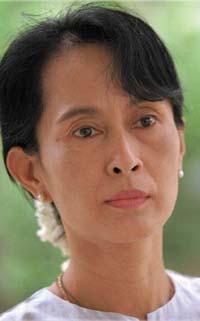Soon after the declaration of the extension of Daw Aung San Suu Kyi's house arrest by the Burmese junta, the condemnation poured on the military rulers from the world communities. From the United Nations to European Union and the United States of America to other pro-democratic regimes in the globe, all came out with string words of criticism against the State Peace and Developing Council, which is ruling the South East Asian country since early Nineties. The Senior General Than Shwe led Burmese regime was targeted for extending the period of house arrest of Suu Kyi by another year even after the Nobel laureate had spent five full years under detention since May, 2003.
The international media has gloomed on the alienated country soon after the cyclone Nargis had devastating vast areas of Burma, also known as Myanmar, on May 2,3 last. After visiting the country and meeting many cyclone victims, the U.N. Secretary-General Ban Ki-Moon, who also met Than Shwe at the capital Nay Pi Taw on May 23, disclosed that more than one hundred thousand people were killed or made homeless by the disaster. The UN chief left for New York on Monday after attending a fund raising meeting at Rangoon, where donors representing various nations pledged for nearly $100 million to support the victims.
But Ban Ki-Moon had bad news once he arrived in New York, as the Burmese government decided to extended the term of house arrest of the pro-democracy icon by another year.
He had no other options than expressing 'regrets' over the action of the junta. Though he believed that 'the sooner the restrictions on Suu Kyi and other political figures are lifted,the sooner Burma will be able to move towards inclusive national reconciliation, the restoration of democracy and full respect for human rights', the UN chief however remainedsilent about Suu Kyi's prolonged detention while discussing with the SPDC chief Than Shwe in Burma.
The extension of Suu Kyi's house arrest has been termed as 'very sad and frustrating' by the European Union. The EU foreign policy chief Javier Solana, while talking to media persons, said that they would continue 'to be deeply concerned by the political situation' as the EU believes that 'transition to democracy remains important for the future of Burma.'
The US President George W. Bush expressed his anguish at the development saying he was 'deeply troubled by the extension of Suu Kyi's house arrest.' President Bush, in a statement, disclosed that the US continues calling 'upon the regime to release all political prisoners in Burma and begin a genuine dialogue with Aung San Suu Kyi, the National League for Democracy, and other democratic and ethnic minority groups on a transition to democracy.'
Earlier an American advocacy group, Freedom Now demanded immediate release of Suu Kyi as she passed five years of house arrest in May, 2008. The group, which initiates to set free the prisoners of conscience through legal, political, and public relations advocacy efforts, raised voice for the release of the detained Burmese icon, arguing that her 'ongoing detention under house arrest was a clear violation of international law.'
Even not to speak of international laws, stated in a press statement of Freedom Now on May 23 from Washington DC added, the Burmese law itself doesn't allow to elongate the
detention of a person, who has not received trail, for more than five years. Under Article 10(b) of Burma's State Protection Law 1975, a person in Burma who is deemed a 'threat to the sovereignty and security of the State and the peace of the people' may be detained for up to a maximum of five years through a restrictive order, renewable one year at a time, the statement asserted.
So, Jared Genser, Freedom Now president argues, The extension of Suu Kyi's house arrest in clear violation of its own law of Burma.' He however did not express surprises at the move, as 'adherence to the rule of law is not their forte.' "The Burmese junta remains deeply concerned about her (Suu Kyi) appeal to the Burmese people, especially in the wake of their denial of relief to millions of its own people after Cyclone Nargis," added Jared Genser, who also serves as a legal counsel to Ms Suu Kyi. The Nobel Laureate Ms Suu Kyi, who spent more than 12 of the past 18 years in detention, was last arrested on May 23, 2003 after the Deepayin massacre. Her house arrest was last extended on May 25, 2007. Therefore, her fifth and final year of house arrest allowable under Burmese law had already expired on May 24, 2008, it asserted. Even the Amnesty International in its latest report too describes that the 'human rights situation in Myanmar continued to deteriorate.'
Ban Ki-Moon had however earned disapproval from some critics as he did not purse for Suu Kyi's release during his meeting with Than Shwe. But he later made it while talking to media in New York that 'his trip was a purely humanitarian one intended to save lives, not to press a pro-democracy agenda,' The UN chief also added, "I went there with a message of solidarity and hope, telling the survivors (of cyclone Nargis) that the world is with you and that the world is ready to help you." But at the end, it is widely understood that that following his personal initiatives, the military rulers of Burma had finally agreed to allow the foreign aid workers, irrespective of their nationalities, to go to the Irrawaddy River Delta areas, where the cyclone Nargis prevailed over on May first week to kill thousands of people and make another thousands families homeless.
(Reporting from Bloomington, USA)





Add new comment